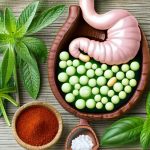Digestion is often an overlooked cornerstone of overall health. We tend to focus on what we eat, but less frequently consider how well our bodies actually process that food. A robust digestive system isn’t just about avoiding bloating or discomfort; it’s fundamental to nutrient absorption, immune function, and even mental wellbeing. When digestion falters – due to factors like stress, poor diet, aging, or certain medical conditions – the consequences can ripple throughout our entire system. Many people seek solutions in over-the-counter digestive aids or prescription medications, but a gentler, more holistic approach often lies within the realm of herbal remedies, specifically those that support and encourage the body’s natural production of digestive enzymes.
The efficiency of digestion hinges on enzymes – biological catalysts that break down food into absorbable components. Different enzymes target different macronutrients: amylase for carbohydrates, protease for proteins, and lipase for fats. When our bodies don’t produce enough of these crucial enzymes, undigested food can lead to fermentation in the gut, causing gas, bloating, and discomfort. More importantly, it hinders nutrient uptake, potentially leading to deficiencies over time. Fortunately, certain herbs possess properties that can gently stimulate the body’s own enzyme production, offering a natural pathway to improved digestive health. This isn’t about replacing enzymes entirely; rather it’s about supporting our inherent ability to digest food effectively and comfortably.
Herbs That Directly Support Enzyme Production
Several herbs have historically been used – and are increasingly being researched – for their capacity to enhance the body’s enzymatic processes. Ginger is perhaps the most well-known, lauded not only for its anti-inflammatory properties but also for its ability to stimulate digestive secretions. It contains compounds like gingerol that aid in protein digestion and can even improve pancreatic enzyme secretion. Similarly, dandelion root isn’t just a weed; it’s a powerful digestive tonic. Dandelion stimulates bile production, which is essential for fat digestion, and promotes the overall health of the liver and gallbladder – both critical organs involved in enzymatic breakdown. Beyond these familiar options, herbs like fennel seed have carminative properties that reduce bloating while also encouraging enzyme release, making it a valuable ally for those with sensitive digestive systems.
The beauty of using herbs to support digestion lies in their holistic nature. They don’t simply address the symptom (like indigestion) but work to restore the underlying function – the body’s innate capacity to break down and absorb nutrients. This is different from taking an enzyme supplement, which provides external enzymes. While supplements can be helpful in certain situations, relying on them long-term may potentially suppress the body’s own enzyme production over time. Herbs, by contrast, gently nudge the system back into balance, encouraging it to function optimally without creating dependence. It’s important to remember that individual responses will vary; what works wonderfully for one person might have a different effect on another, so experimentation and mindful observation are key.
Herbal Approaches For Specific Digestive Issues
Bloating & Gas
Bloating and gas often stem from incomplete digestion of carbohydrates, leading to fermentation in the gut. Several herbs can directly address this issue. Chamomile is renowned for its calming properties, but it also contains compounds that relax the digestive tract and reduce intestinal spasms. This allows food to move more smoothly through the system, minimizing fermentation. Fennel seed, as mentioned previously, isn’t just about reducing gas; its ability to stimulate enzyme production helps break down carbohydrates before they have a chance to ferment. A simple remedy for bloating involves sipping chamomile tea after meals or chewing on a few fennel seeds. – Consider combining with peppermint leaf for added relief. – Avoid overly processed foods and sugary drinks, which contribute to fermentation.
Another effective approach is using caraway seed. Traditionally used in European cuisine, caraway has potent carminative properties, meaning it helps dispel gas from the digestive tract. It’s often included in dishes containing beans or cabbage – known for causing bloating – to aid digestion and reduce discomfort. You can incorporate caraway seeds into your cooking or brew a tea using a teaspoon of crushed seeds steeped in hot water for 10-15 minutes. The key is consistency; regular use can help improve overall digestive function and prevent excessive gas buildup. Remember, addressing the root cause – often dietary choices – is crucial alongside herbal support.
Low Stomach Acid & Protein Digestion
Many people unknowingly suffer from low stomach acid (hypochlorhydria), which hinders protein digestion and nutrient absorption. This can lead to symptoms like bloating after meals, undigested food in stool, and deficiencies of vital nutrients. Gentian root is a classic bitter herb used to stimulate gastric acid production. It’s incredibly potent, so it’s typically used in small doses – just a few drops of tincture before meals. – Caution: Avoid if you have ulcers or GERD. – Start with very low doses and observe your body’s response. Artichoke leaf also supports digestion by stimulating bile production, which is essential for breaking down fats and aiding protein absorption.
Beyond gentian, peppermint can indirectly improve protein digestion by relaxing the digestive tract and allowing stomach acid to work more effectively. It’s important to note that low stomach acid isn’t always about increasing acid; it’s often about improving the body’s ability to use the acid it already produces. Lifestyle factors like stress management and mindful eating play a significant role in optimizing digestion, even with herbal support. A holistic approach that addresses both internal and external factors is most effective for long-term digestive health.
Irritable Bowel Syndrome (IBS) & Gut Inflammation
Irritable Bowel Syndrome (IBS) is a complex condition characterized by abdominal pain, bloating, gas, diarrhea, and constipation. While herbs cannot cure IBS, they can help manage symptoms and reduce inflammation. Slippery elm bark has demulcent properties, meaning it coats and soothes the digestive tract, reducing irritation. It’s particularly helpful for those with diarrhea-predominant IBS. – Slippery elm interacts with medications; consult a healthcare professional before use. Turmeric, containing curcumin, is a potent anti-inflammatory agent that can help reduce gut inflammation associated with IBS.
Another herb to consider is marshmallow root. Like slippery elm, it’s demulcent and soothing, but it also contains polysaccharides that support the growth of beneficial gut bacteria. A healthy microbiome is crucial for managing IBS symptoms. It’s important to identify your specific IBS triggers – food sensitivities, stress, etc. – alongside herbal remedies. Herbal support should be part of a broader strategy that includes dietary modifications, stress management techniques (yoga, meditation), and potentially working with a healthcare professional specializing in gut health. Remember, consistency is key; it takes time for herbs to exert their full benefits.
It’s vital to approach herbal remedies with respect and awareness. While generally safe when used appropriately, herbs can interact with medications or have contraindications depending on individual health conditions. Always consult with a qualified healthcare professional before starting any new herbal regimen, especially if you are pregnant, breastfeeding, or taking other medications. This article provides information for educational purposes only and is not intended as medical advice.


















